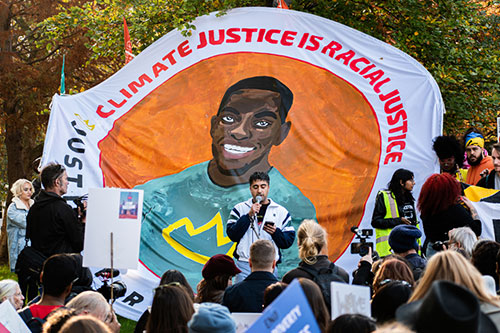
On 20 February, INQUEST published an investigation into the procedures of both the police watchdog, the Independent Office for Police Conduct (IOPC), and the coroner system, with a focus on accountability for racism. As we head towards the third anniversary of the death of George Floyd on 25 May, PN is publishing extracts from the executive summary of the INQUEST report, I can’t breathe: race, death and British policing. INQUEST campaigns for truth, justice and accountability for state-related deaths.
The system of accountability for racism and racial discrimination in deaths of Black people following police contact is not fit for purpose.
The police watchdog, inquests and the crown prosecution service have historically failed – and continue to fail – to scrutinise the role that racial stereotyping might have played in these deaths, especially where excessive force is used.
The result is that officers are not held accountable; there is no systemic learning and change, and more deaths of Black people occur in similar circumstances.
The detailed report makes the following issues clear for the first time:
- Official data, never before made public, shows that Black people are seven times more likely to die than White people following the use of restraint by police.
- No death of a Black person following police custody or contact has led to officers being disciplined for racism, at a conduct or criminal level,
- Despite the stark racial disproportionality evidenced in data, none of the accountability processes effectively or substantially consider the potential role of racism in deaths.
Britain’s leading human rights lawyers told INQUEST that the role of racism is not adequately scrutinised by post-death investigation systems.
The report features new data and analysis. It includes powerful interviews with expert human rights lawyers who are members of the INQUEST Lawyers Group, and bereaved family members who have been through the legal processes....
Families
INQUEST spoke in depth to six family members of five Black men who died following the use of force by the police.
We asked them specifically about consideration of the potential role that racism played in their loved one’s death through the investigatory processes.
All have been through an investigation, inquest hearing and have a jury conclusion.
The question of whether racism contributed to the treatment of a loved one is invariably in the minds of Black families, but not one most felt they could raise.
Their reluctance to raise race with the IOPC [Independent Office for Police Conduct] and in public statements during the investigation was because they feared being seen to ‘play the race card’ and provoke additional hostility in a process they experienced from the outset as adversarial.
In the aftermath of the deaths, the families experienced the police seeking to deflect from and minimise their possible wrongdoing by demonising their loved ones and drawing on racist stereotypes of Black men that ‘vilified’ them.
Most of the families interviewed felt raising racism with the police watchdog, the media and wider public would be construed as being acrimonious; used against them; and hinder their prospects of unearthing the truth about how their family member died.
According to the IOPC’s own guidelines, it is the responsibility of the watchdog to bring discrimination to light. The onus lies with the IOPC to identify possible lines of inquiry – not bereaved families.
Families want only for the IOPC to do its job and carry out its duty by explicitly referring to and thoroughly investigating racial discrimination where it is apparent that it may be relevant.
Yet families said that neither the IOPC investigation nor the inquest adequately addressed their questions about why their loved one met with force, not care; why they were treated as a threat rather than in need of help and why force was escalated when their relative was asking for assistance.
Without these questions substantially answered and no one held accountable, many Black families saw racism as being the only explanation for the police’s actions.
One argument INQUEST heard from families was that Black people appear less deserving of care and concern in the eyes of the police.
Underlying this point of view is that racism is not merely about words but about the value society places on different groups of people and the fact that Black men, in some cases also with mental ill health, are given very little.
Without fully employing an analytical framework to consider discrimination – despite the watchdog’s own guidance – IOPC investigators often are seen to narrow down their inquiry and obscure the context of race within the case.
Such an analysis would attempt to draw conclusions about whether an officer has a case to answer on the grounds of racial discrimination from known facts about the statistical link between police use of force and race.
This is not how the IOPC makes decisions. Instead, in the absence of direct racist verbal abuse or digital messages, IOPC investigators are either unable or unwilling to admit race as influencing an officer’s actions in relation to the use of force.

